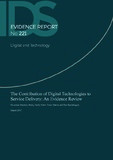The Contribution of Digital Technologies to Service Delivery: An Evidence Review
| dc.contributor.author | Sharmin, Shumona | |
| dc.contributor.author | Faith, Becky | |
| dc.contributor.author | Prieto Martín, Pedro | |
| dc.contributor.author | Ramalingam, Ben | |
| dc.date.accessioned | 2017-03-16T09:23:21Z | |
| dc.date.available | 2017-03-16T09:23:21Z | |
| dc.date.issued | 2017-03 | |
| dc.identifier.citation | Sharmin, S.; Faith, B.; Prieto Martín, P. and Ramalingam, B. (2017) The Contribution of Digital Technologies to Service Delivery: An Evidence Review, IDS Evidence Report 221, Brighton: IDS | en |
| dc.identifier.uri | https://opendocs.ids.ac.uk/opendocs/handle/20.500.12413/12862 | |
| dc.description.abstract | The explosion in digital connectivity, globalisation and the rapid growth in digital technologies over the last two decades has revolutionised the way that businesses perform and compete globally. Governments around the world have been put under strong pressure to transform themselves into electronic governments, in recognition of the efficiencies brought about by the appropriate use of information communication technologies (ICTs) in businesses and the need for development. The aim has been to maximise the state’s capacity to serve its stakeholders: namely citizens, business, employees and other government and non-government agencies. E-government or digital government has been a significant feature of public sector reform in recent years in both developed and developing countries with a substantial amount of resources dedicated to the development of necessary systems and infrastructure. Yet the transformational potential of digital for development risks not being replicated in the real world. Large-scale and sustainable use of ICTs for education is not yet being realised in developing countries, despite the fact that digital technologies have the potential to reduce costs and strengthen education systems. In the field of health care, mHealth systems are reaching significant scale in many developing countries but there is still a lack of concrete evidence with which to fully assess the economic impact of these technologies. This report explores and assesses the evidence for the impact and use of digital technologies in development, identifying cross-cutting themes that are important for use, implementation and scale-up. These include funding and infrastructure, policy commitments by government, skills and leadership. | en |
| dc.description.sponsorship | UK Department for International Development | en |
| dc.language.iso | en | en |
| dc.publisher | IDS | en |
| dc.relation.ispartofseries | IDS Evidence Report;221 | |
| dc.rights | This is an Open Access publication distributed under the terms of the Creative Commons Attribution License, which permits unrestricted use, distribution, and reproduction in any medium, provided the original author and source are clearly credited. | en |
| dc.rights.uri | http://creativecommons.org/licenses/by/4.0/ | en |
| dc.subject | Education | en |
| dc.subject | Health | en |
| dc.subject | Technology | en |
| dc.title | The Contribution of Digital Technologies to Service Delivery: An Evidence Review | en |
| dc.type | IDS Evidence Report | en |
| dc.rights.holder | IDS | en |
| dc.identifier.ag | OT/11009/3/1/743 | |
| rioxxterms.funder | Default funder | en |
| rioxxterms.identifier.project | Default project | en |
| rioxxterms.version | VoR | en |
| rioxxterms.funder.project | c941507f-fd0b-4fc3-9822-4b2132f61a1d | en |
Files in this item
This item appears in the following Collection(s)
Except where otherwise noted, this item's license is described as This is an Open Access publication distributed under the terms of the Creative Commons Attribution License, which permits unrestricted use, distribution, and reproduction in any medium, provided the original author and source are clearly credited.


